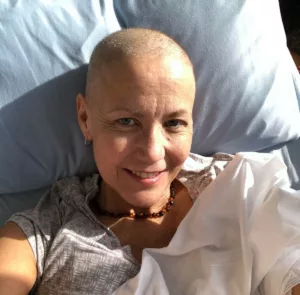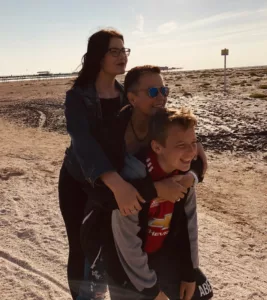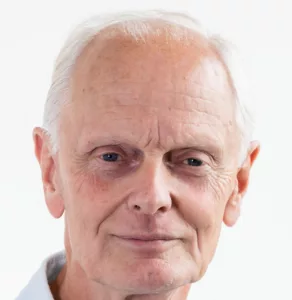
17 Apr 2024 Awareness raising
“Every little thing is gonna be alright” – three little birds tattoo marks mum’s recovery from one of the least survivable cancers
New research by Leukaemia UK which could reduce the side-effects of treatment for acute myeloid leukaemia (AML) welcomed by family affected by the disease.
A family who was devastated when their mum was diagnosed with acute myeloid leukaemia (AML) are hoping that new research, funded by Leukaemia UK, could help dramatically reduce the impact that harsh treatments can have on those diagnosed.
 Mum-of-two Bex Despard, 56, was diagnosed with AML in 2017 after becoming so exhausted she could barely walk up the steps to her flat. The morning after her diagnosis, her son Trystan, now 18, sent her the song ‘Three Little Birds’ by Bob Marley. “It was his way of reassuring me ‘every little thing is gonna be alright’. It became a theme throughout everything that was to come,” said Bex.
Mum-of-two Bex Despard, 56, was diagnosed with AML in 2017 after becoming so exhausted she could barely walk up the steps to her flat. The morning after her diagnosis, her son Trystan, now 18, sent her the song ‘Three Little Birds’ by Bob Marley. “It was his way of reassuring me ‘every little thing is gonna be alright’. It became a theme throughout everything that was to come,” said Bex.
She underwent two gruelling rounds of chemotherapy which left her underweight and hugely fatigued as she was unable to eat, and she also started losing her long hair. Bex decided to shave her head during the second round.
This second round also triggered a life-threatening bout of sepsis and Bex spent seven weeks at the Royal Liverpool Hospital, including over the Christmas period, having heart palpitations and repeatedly going into shock. Five years later, she then had a brain haemorrhage after having a final of 15 bone marrow biopsies to monitor her condition, which she fortunately recovered from. She has now been in remission for nearly six years. On the five-year anniversary since her diagnosis, Bex had a tattoo on her wrist of three little birds from the song Trystan had sent to her right at the beginning.
 To mark AML World Awareness Day on Sunday 21st April, Leukaemia UK has announced it is funding a new project which could lead to treatments with fewer side effects for patients like Bex in the future. Bex is hopeful that this new research will mean others don’t have to go through the difficulties she and her family did because of such aggressive treatment.
To mark AML World Awareness Day on Sunday 21st April, Leukaemia UK has announced it is funding a new project which could lead to treatments with fewer side effects for patients like Bex in the future. Bex is hopeful that this new research will mean others don’t have to go through the difficulties she and her family did because of such aggressive treatment.
Bex said: “The first round of chemotherapy lulled me into a false sense of security for the second. That time around, I was unable to do even the most basic things. I remember lying in the hospital bed one day looking at the basin a metre away from my bed and thinking I just can’t get there to brush my teeth. I had lost so much weight because I was vomiting so regularly – I was so weak.
“When I got sepsis, my doctor said he didn’t know how I didn’t have a heart attack. During the first few days, I kept going into shock, my temperature spiking and crashing, and I had uncontrollable shaking. The care they gave was amazing, but my body was completely depleted. I am so pleased this is now all behind me – I just hope this funding will ensure there’s kinder treatment options for others who are diagnosed with this awful disease.”
 Professor Terry Rabbitts, Professor of Molecular Immunology at the Institute of Cancer Research in London, is exploring a new approach to targeting AML cancer cells.
Professor Terry Rabbitts, Professor of Molecular Immunology at the Institute of Cancer Research in London, is exploring a new approach to targeting AML cancer cells.
Professor Terry Rabbitts said: “Leukaemia is caused by mutations in the DNA of normal cells, causing them to become cancerous. Sometimes chromosomes break and are joined to other chromosomes. If this happens it can result in ‘fusion proteins’ – these only occur in cancer cells, so they are specific targets for treatment. My team and I will explore a new approach to targeting fusion proteins by channelling antibodies inside cancer cells.
“We have already begun a new technology that will allow us to deploy antibodies inside cells. Our aim is to get them to bind with the fusion proteins inside cancer cells to destroy them. This new anti-cancer strategy will mean fewer side effects for AML patients and should ultimately also benefit other blood cancers and solid tumours.”
AML World Awareness Day aims to raise awareness of this specific type of leukaemia, which is the second most common type yet has survival rates which are among the worst of any cancer type – just 13.6% of those diagnosed live for longer than five years after their diagnosis.
Fiona Hazell, Chief Executive of Leukaemia UK, said: “AML is one of the most common types of leukaemia, but has the worst survival rates. The treatments, which have remained largely unchanged since the 1960s, are harsh and can cause terrible side effects like the ones Bex sadly experienced.
“We’re delighted to announce Prof Rabbitts’ new project, which, along with our other funded research projects, will help us to accelerate progress in leukaemia treatment and care. We want to offer patients like Bex the hope of more effective and gentler treatments in the future. Breakthroughs happen all the time and we won’t stop until we have found better, kinder treatments for all those affected.”
Bex added: “I’m delighted to hear about Prof Rabbitts’ research, which aims to unlock kinder, more targeted treatments for AML patients. I am so grateful for the intensive chemotherapy which put me into remission, but it came at such a cost to my overall health. More targeted treatments with less side effects are the future for cancer care. I’m very grateful to Leukaemia UK and its supporters for all the work it does to help people like me. I celebrate every day that I am given, and I love the life that I live.”
Related posts
5 March 2025
Leukaemia UK chosen to be featured charity partner of Scrap Car Comparison
Leukaemia UK will be the featured charity partner of Scrap Car Comparison’s ‘Donate a Car’ scheme this March. The scheme will help raise money to stop leukaemia devastating lives by…
24 September 2021
Leading leukaemia charities call on Rishi Sunak not to cut financial lifeline for blood cancer patients
Leukaemia Care, Leukaemia UK and Leukaemia and Lymphoma Northern Ireland, have written to the Chancellor urging him to realise the devastating impact the end of the Coronavirus Job Retention Scheme will have on the clinically extremely vulnerable (CEV).
18 November 2024
Leukaemia UK’s Patient Care Pioneer Award fuels innovative research to revolutionize ‘watch and wait’ approach
Leukaemia UK is excited to announce Professor Francesco Forconi from University Hospital Southampton (UHS) as the first recipient of its Patient Care Pioneer Award. Through this new funding initiative, Professor…
27 August 2020
Leukaemia UK appoints new CEO
The trustees of Leukaemia UK are delighted to announce that they have appointed Fiona Hazell as CEO of Leukaemia UK. Fiona brings a strong track record in not-for-profit leadership, starting her role on 9th September 2020.